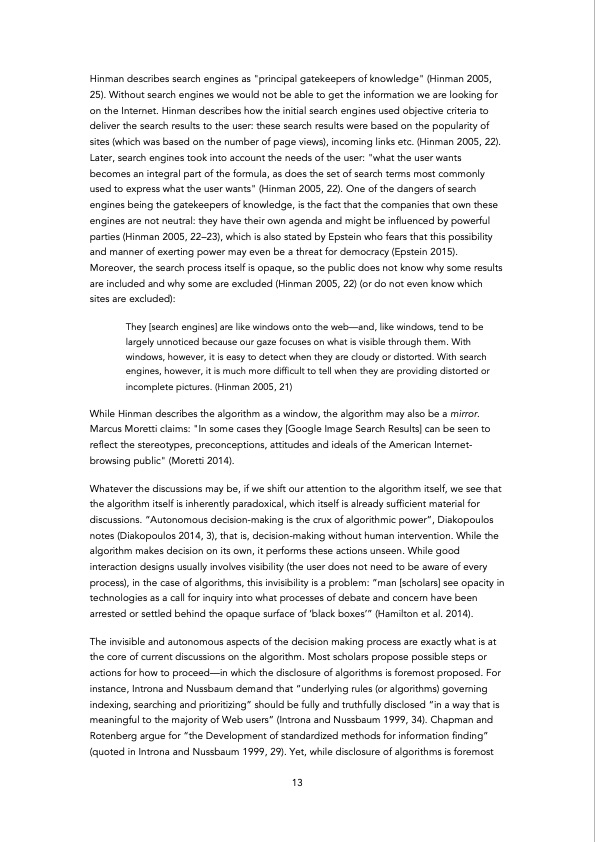
PDF Publication Title:
Text from PDF Page: 013
Hinman describes search engines as "principal gatekeepers of knowledge" (Hinman 2005, 25). Without search engines we would not be able to get the information we are looking for on the Internet. Hinman describes how the initial search engines used objective criteria to deliver the search results to the user: these search results were based on the popularity of sites (which was based on the number of page views), incoming links etc. (Hinman 2005, 22). Later, search engines took into account the needs of the user: "what the user wants becomes an integral part of the formula, as does the set of search terms most commonly used to express what the user wants" (Hinman 2005, 22). One of the dangers of search engines being the gatekeepers of knowledge, is the fact that the companies that own these engines are not neutral: they have their own agenda and might be influenced by powerful parties (Hinman 2005, 22–23), which is also stated by Epstein who fears that this possibility and manner of exerting power may even be a threat for democracy (Epstein 2015). Moreover, the search process itself is opaque, so the public does not know why some results are included and why some are excluded (Hinman 2005, 22) (or do not even know which sites are excluded): They [search engines] are like windows onto the web—and, like windows, tend to be largely unnoticed because our gaze focuses on what is visible through them. With windows, however, it is easy to detect when they are cloudy or distorted. With search engines, however, it is much more difficult to tell when they are providing distorted or incomplete pictures. (Hinman 2005, 21) While Hinman describes the algorithm as a window, the algorithm may also be a mirror. Marcus Moretti claims: "In some cases they [Google Image Search Results] can be seen to reflect the stereotypes, preconceptions, attitudes and ideals of the American Internet- browsing public" (Moretti 2014). Whatever the discussions may be, if we shift our attention to the algorithm itself, we see that the algorithm itself is inherently paradoxical, which itself is already sufficient material for discussions. “Autonomous decision-making is the crux of algorithmic power”, Diakopoulos notes (Diakopoulos 2014, 3), that is, decision-making without human intervention. While the algorithm makes decision on its own, it performs these actions unseen. While good interaction designs usually involves visibility (the user does not need to be aware of every process), in the case of algorithms, this invisibility is a problem: “man [scholars] see opacity in technologies as a call for inquiry into what processes of debate and concern have been arrested or settled behind the opaque surface of ‘black boxes’” (Hamilton et al. 2014). The invisible and autonomous aspects of the decision making process are exactly what is at the core of current discussions on the algorithm. Most scholars propose possible steps or actions for how to proceed—in which the disclosure of algorithms is foremost proposed. For instance, Introna and Nussbaum demand that “underlying rules (or algorithms) governing indexing, searching and prioritizing” should be fully and truthfully disclosed “in a way that is meaningful to the majority of Web users” (Introna and Nussbaum 1999, 34). Chapman and Rotenberg argue for “the Development of standardized methods for information finding” (quoted in Introna and Nussbaum 1999, 29). Yet, while disclosure of algorithms is foremost 13PDF Image | peek into the discursive construction of the Google Search Algorithm: A critical discourse analysis

PDF Search Title:
peek into the discursive construction of the Google Search Algorithm: A critical discourse analysisOriginal File Name Searched:
thesis-google-search-algotithm.pdfDIY PDF Search: Google It | Yahoo | Bing
Cruise Ship Reviews | Luxury Resort | Jet | Yacht | and Travel Tech More Info
Cruising Review Topics and Articles More Info
Software based on Filemaker for the travel industry More Info
The Burgenstock Resort: Reviews on CruisingReview website... More Info
Resort Reviews: World Class resorts... More Info
The Riffelalp Resort: Reviews on CruisingReview website... More Info
| CONTACT TEL: 608-238-6001 Email: greg@cruisingreview.com | RSS | AMP |